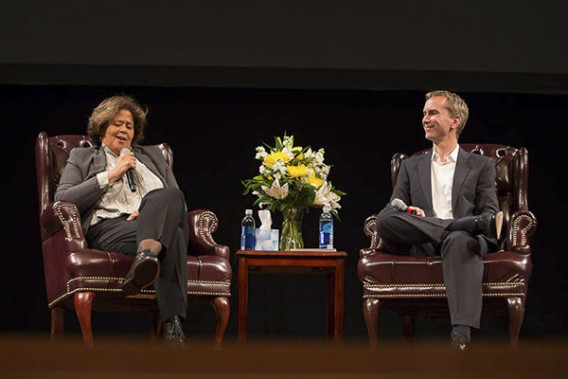Anna Deavere Smith talks about the healing power of stories

On Oct. 28, hundreds gathered at Memorial Auditorium for a night of storytelling and conversation with former Stanford faculty member ANNA DEAVERE SMITH, an award-winning pioneer in the field of documentary theater.
Smith is best known for her one-woman, multi-character performances, which depict people reflecting on moments of intense catastrophe. Her plays range in dramatic scope from the Rodney King race riots in Los Angeles to the failing health care systems of post-Katrina New Orleans.
Between rehearsals and preparations for her latest play, Notes from the Field: Doing Time in Education, Smith engaged in a conversation on the nature of her craft, the intricacies of her process and the impact of her work, particularly with regard to healing.
JONAH WILLIHNGANZ, director of the Stanford Storytelling Project, joined Smith onstage. The event was hosted by Stanford Continuing Studies and the Stanford Storytelling Project. It followed Smith’s three-week, performance-laden residency, sponsored by Stanford Live and the Office for Religious Life.
Smith, whose numerous awards include the Pulitzer Prize, a MacArthur Award and a National Humanities Medal, answered questions about her work. She is currently a professor at New York University’s Tisch School of the Arts.
When asked for advice to students and aspiring storytellers, she said, “Confidence is overrated. Give doubt a try.”
She explained that doubt provides students with the lens and capacity to question and to listen – crucial for any effective storyteller. Smith sees confidence as an obstacle to preparing students to maintain composure when faced with distress.
Smith typically creates a play by compiling testimonies from hundreds of interviews she personally conducts with people. She then distills those stories to offer multiple perspectives on frequently controversial issues. Her latest work investigates the school to prison pipeline that plagues minority and poor communities.
Smith said, “I’m looking for audiences to be active participants to solve these moments of crisis because all I can do is shout.”
Smith emphasized the importance of the relationship between the performer and the audience as the place of healing. One of the evening’s highlights was a video from her play Let Me Down Easy, a composition of reflections from individuals after the devastation of Hurricane Katrina.
Smith recognized the importance of hospitality when she interviewed the oral historian Studs Terkel, she said, and her interviews with economist Thomas Sargent taught her about maintaining oneself in face of uncertainty. She also referenced her time teaching Stanford freshmen and recalled learning how to be present.
Smith made it clear that she recognized the potential of the words we all individually and collectively carry. Afterward, Willihnganz observed that Smith’s work provides students with a powerful example of the social and personal benefits of art.
“All of us, I think, could learn and grow a lot simply by interviewing people unlike ourselves and then trying to tell their stories to others in our communities,” Willihnganz said.

